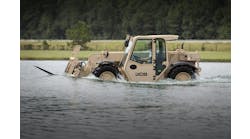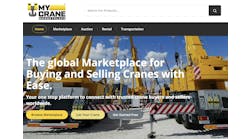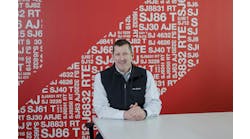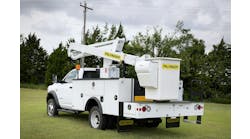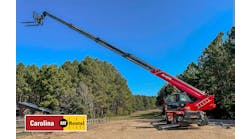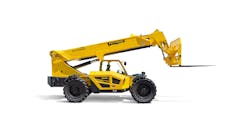In the beginning, all Rick Dahl really needed was a telephone.
A wholesale broker, Dahl would buy a lift in Rhode Island and sell it to somebody in California. He'd buy another in Denver and sell it to a user in South Carolina. Although he didn't know where the future was going to lead, Dahl was building something very important — his reputation. In an industry where machines were often bought and sold sight unseen, the word of the salesman can make or break a deal and word got around that if Rick Dahl bought you a machine, you'd be satisfied.
It wasn't a strategy, it wasn't a business plan. It was an innate ability to communicate with people that propelled Dahl to be successful. He liked people and people trusted him.
It was before e-mail, when overnight mail was limited. “It was a completely different way of doing business,” recalls Dahl. “We'd take Polaroid shots of a machine and mail them to a customer and it was a week before he made his decision.”
The scope of that business, which Dahl started out of his home and incorporated in 1991, would soon expand considerably. Soon Dahl was buying packages of equipment as groups of machines became available.“If there was a good enough bargain, I'd buy a whole package because I knew I could sell it,” Dahl says. “When some of those packages were large enough, I would keep some of the equipment and customers would have the machines on their yard and they'd say, ‘As long as it's sitting here, would you mind if we rent it?’ And that was my transition into wholesale re-rental.”
Dahl developed good relationships with local independent rental companies that specialize in aerial equipment, many of which were his regular used equipment customers. When those companies needed a piece of equipment that they didn't have and lacked the capital to buy, Metrolift became an indispensable re-rental source.
Dahl also became a player in the parts business. A lot of customers didn't know where to obtain parts and Dahl took the initiative to develop a network. He knew who was selling what and who could be relied on to obtain parts for different types of machines, and how to get them delivered quickly. Now Dahl employs a full-time parts manager who, through networking, communicating and building relationships, has continued to expand Metrolift's parts-supplying capability and expertise.
Within a few years, Dahl had built a fleet of several hundred machines and was doing steady re-rental business, although his primary focus was still used sales. But consolidation altered the equipment roadmap, especially in large metropolitan areas such as Chicago. Once most of the area's independents were acquired, the local re-rental market diminished. So he decided he needed a different marketing plan and before long Metrolift became a retail company, part sales and part rentals of aerial work platforms and forklifts, renting to construction contractors, with three outside sales people visiting job sites and industrial plants (the company now has six).
Since that time the growth of Metrolift has been strong, with the company now owning more than 500 aerial units and bringing in more than $5 million in revenue in 2002 — about half rental and half sales a number the company expects to top in 2003, especially in rentals. Metrolift has added an additional service facility on what was vacant farmland next door, and the company now has 20 employees.
In 1997, Dahl moved the company from suburban Elmhurst out to the western edge of the Chicagoland area to the small community of Sugar Grove. Although it's a couple of miles from a highway and within a half hour drive from the hustle and bustle of the United States' third largest market, one can hear the sound of crickets chirping in the afternoon as one walks around Metrolift's facility.
The large property has some advantages for Metrolift. The obvious one is being able to store a large quantity of fleet there. “My attitude was to go out further so I could spend less on a facility and spend extra money on my trucks and my people,” says Dahl. “I got them brand new Peterbilts and brand new Ford service trucks, because they spend a lot of time in their vehicles and happy mechanics are important. I expect a lot out of our people and I think that I should support the infrastructure for them to perform their jobs correctly.”
Dahl and his family moved to the rural area near Sugar Grove in 1996. He noticed that in the Chicago area, the west was the logical direction for growth. One can't go east, where the lake is, and although the area south of Chicago has had growth spurts, now the direction is north and west. Property and property taxes are far more affordable than they would be closer to the city and yet the extensive highway network allows Metrolift's delivery vehicles to be able to reach any part of Chicago fairly quickly, especially with morning deliveries starting at the crack of dawn. Metrolift is able to make deliveries to Indiana, Wisconsin and southern Illinois fairly quickly.
With such a large delivery area, Metrolift employees are in at 4:30 preparing deliveries, getting two runs finished by early afternoon, after which they can begin on suburban runs. Even with such fast growth, Dahl is already debating the need to spread out with another branch. “Because of the transportation issues we face with the size of this market, it's difficult to support that growth from one facility,” says Dahl.
Kings and queens
Rick Dahl is, above all, a people person. One of the reasons he enjoys the aerial rental business is the friendships he has formed and his relationships with customers, competitors, suppliers and employees make the business rewarding.
Dahl's people-first philosophy radiates out to the customers. As parts manager Donna Bong says, “Rick puts his all into it and when the caring attitude comes from the top, that attitude reflects throughout the company.”
Dahl typically is in his office well before 6 a.m. and rarely leaves before 7 at night. Part of the company's strength is the relationships it builds with its customer base. It helps that Dahl is around the office and easy to reach, and quick to make decisions. The company has staff in the building until well after six o'clock most evenings after which the phones roll over to the cell phones of staff members, including Dahl.
“We make decisions on the spot,” says Dahl. “If there is a billing problem or some issue with a customer, everyone has the autonomy to make that decision. I like to know what's being decided, but our customer doesn't really have a lot of time to be messing around over a billing problem. It's handled, it's done and then we go on to the next issue.”
Todd Arganbright, Metrolift's operations manager, emphasizes the importance the company gives to quick response time. “That's number one in my book when it comes to service,” Arganbright says. “If the customer calls with a need or a question, to be able to make a decision immediately, or it requires a callback, to be able to get back to them within an hour. We believe in really responding immediately, like guerilla warfare. Rick and I were both brought up to care about people that way and customers appreciate it. We like challenges and quick response is a challenge we try to live by.”
Office manager Colleen Burkes goes by the same credo and believes that's the key to Metrolift's success. “We keep things organized so everything is easy to find, she says. “If a customer calls, we don't have to look for their file, we don't have to hunt all over for the information, we can answer them immediately.”
Burkes also cites accessibility to the owner as important value. “The owner gets involved with the customer in ways that owners of other equipment companies don't,” she adds. “It makes a big difference. Our customers feel that they know the owner and if they have an issue, he will always be available to respond to their concerns.”
While aggressively going after new customers is a big part of the daily business of any rental company, that kind of attention to the needs and concerns of existing customers is a key ingredient to Metrolift's way of doing business.
“Your best customers are the ones calling you,” says Dahl. “My attitude is if a guy is picking up a phone to call me, he either wants to do a deal with me, or he has problems getting it somewhere else and here's our first chance to deal with him. We believe that once you deal with Metrolift, we treat you like kings and queens. It's hard to lose a customer, it's hard to get them back and it's so hard to get a new one. So why not take care of your base that's been dealing with you from Day One? That's our philosophy, and we don't have too many customers going away from us.”
Metrolift is located off a fairly busy road and with aerial lifts being tall and up in the air, people passing by see them, and a lot of drop-in business of local farmers and other used equipment buyers has helped the company to develop a strong local clientele. The informality of the rural environment seems to encourage drop-ins, and the Metrolift staff will perform a demo for anybody who wanders off the highway.
“And we join a lot of associations, such as the local contractors' association, and we go to open houses and chamber of commerce meetings,” says Dahl. “This is my home court. We're a Chicagoland-based company and we're going to pursue business in the whole area, but here in the west, we're going to let people know we're here.”
Dahl is also a member of the Oxford Bank Advisory Board, a local independent five-branch bank that primarily does business in Chicago's northwest suburbs. The bank has been supportive of Metrolift, facilitating credit consistently and Dahl was invited to serve as an advisor, giving feedback on a variety of issues.
Overall, the basic marketing of Metrolift is similar to the way most rental companies operate. “I'm from the old school,” Dahl says. “I have guys do demos, I have my salesmen drive a truck. If I have a problem with a delivery, one of my salesmen could hop right in that rollback and do a delivery. We do a lot of sales training, a lot of safety training. We like going to job sites, we show up on a job site at 5:30 in the morning. We'll even bring donuts, we want to be the customer's friend, but we also want to be objective about the business.”
One of the strengths of Metrolift is its willingness to work with customers to adapt equipment to specific needs of jobs. “We're willing to do whatever it takes, to go out of the ordinary,” says Dahl. “We're willing to find equipment if they need it, we're willing to source parts and machines, spend time trying to figure out the best applications on jobs and go the extra mile.”
Uniquely efficient solutions
Metrolift recently took another step in the direction of greater efficiency with the development of a custom-designed computer system, designed for it by a local company, Wayne, Ill.-based Unique Solutions.
The program, designed for aerial rentals and adapted to deal with other Metrolift products such as forklifts and skid-steer loaders is designed for the needs of the company, rather than selling a package of pre-designed programs. The real-time system allows Metrolift to track the status of each piece of inventory, its history and the history of each customer.
“Often a rental customer will call and say, “I want the same piece of equipment I had on the job in such and such a place two years ago,” says Doug Grice of Unique Solutions. “This systems can trace that immediately.” The recently installed system can produce virtually any type of report the company needs, from almost any perspective and is helping to make an already well-organized company even more efficient.
Service work
In addition to its own service needs, Metrolift does service work for customers, especially on Skyjack and Genie products with which staff is most familiar. The Home Depot stores in the area recently began handling Genie and the Metrolift staff does its service work and trained its staff on proper operation and safety practices. It recently expanded its service capability with the acquisition of a building next door, with new service bays and a new paint booth.
Dahl and Metrolift are living proof that there is still plenty of room in the rental industry for smaller companies that find the right niche and serve them. Its people are empowered to do their job and service customers to their maximum level of commitment. The company's 10-point system is designed to illustrate to customers the advantages it offers: it is independently owned, it can solve problems immediately and it will custom-design solutions to aerial equipment problems.
And while it employs many kinds of advanced technology, it still gets back to communication and people, just as it was when Dahl sat in his one-man office buying and selling machines across the continent.
AN RER CAPSULE
METROLIFT INC., SUGAR GROVE, ILL.
History: After short stints in equipment retail and wholesale, Rick Dahl started Metrolift out of his home in suburban Chicago in 1991, as an equipment broker. As Dahl's business grew, he began buying larger packages of equipment and storing it at customers' yards. Soon interest developed among customers in re-rental opportunities and gradually Dahl grew into the re-rental business, eventually evolving into renting to contractors and industrial end-users. Metrolift moved to its current location in Sugar Grove, on the western edge of greater Chicagoland, in 2002.
Inventory: Genie and Skyjack scissors and booms, Terex rough-terrain and telescopic forklifts, Bobcat skid-steer loaders.
Revenue: 2002 revenue was about $5 million, about half rental and half sales. Rental revenue is expected to be higher in 2003.
Key management: Owner Rick Dahl; operations manager Todd Arganbright; office manager Colleen Burkes; parts manager Donna Bong.
